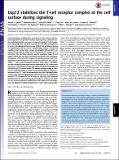Usp12 stabilizes the T-cell receptor complex at the cell surface during signaling
Author(s)
Jahan, Akhee S.; Lestra, Maxime; Swee, Lee Kim; Fan, Ying; Lamers, Mart M.; Tafesse, Fikadu G.; Theile, Christopher S.; Spooner, Eric; Bruzzone, Roberto; Sanyal, Sumana; Ploegh, Hidde; ... Show more Show less
DownloadJahan-2016-Usp12 stabilizes the.pdf (1.454Mb)
PUBLISHER_POLICY
Publisher Policy
Article is made available in accordance with the publisher's policy and may be subject to US copyright law. Please refer to the publisher's site for terms of use.
Terms of use
Metadata
Show full item recordAbstract
Posttranslational modifications are central to the spatial and temporal regulation of protein function. Among others, phosphorylation and ubiquitylation are known to regulate proximal T-cell receptor (TCR) signaling. Here we used a systematic and unbiased approach to uncover deubiquitylating enzymes (DUBs) that participate during TCR signaling in primary mouse T lymphocytes. Using a C-terminally modified vinyl methyl ester variant of ubiquitin (HA-Ub-VME), we captured DUBs that are differentially recruited to the cytosol on TCR activation. We identified ubiquitin-specific peptidase (Usp) 12 and Usp46, which had not been previously described in this pathway. Stimulation with anti-CD3 resulted in phosphorylation and time-dependent translocation of Usp12 from the nucleus to the cytosol. Usp12−/− Jurkat cells displayed defective NFκB, NFAT, and MAPK activities owing to attenuated surface expression of TCR, which were rescued on reconstitution of wild type Usp12. Proximity-based labeling with BirA-Usp12 revealed several TCR adaptor proteins acting as interactors in stimulated cells, of which LAT and Trat1 displayed reduced expression in Usp12−/− cells. We demonstrate that Usp12 deubiquitylates and prevents lysosomal degradation of LAT and Trat1 to maintain the proximal TCR complex for the duration of signaling. Our approach benefits from the use of activity-based probes in primary cells without any previous genome modification, and underscores the importance of ubiquitin-mediated regulation to refine signaling cascades.
Date issued
2016-02Department
Massachusetts Institute of Technology. Department of Biology; Whitehead Institute for Biomedical ResearchJournal
Proceedings of the National Academy of Sciences
Publisher
National Academy of Sciences (U.S.)
Citation
Jahan, Akhee S. et al. “Usp12 Stabilizes the T-Cell Receptor Complex at the Cell Surface during Signaling.” Proceedings of the National Academy of Sciences 113.6 (2016): E705–E714. © 2016 National Academy of Sciences
Version: Final published version
ISSN
0027-8424
1091-6490